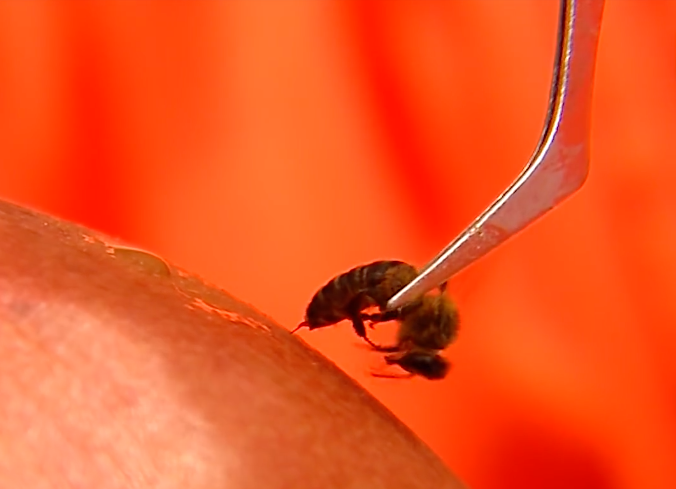Apitherapy on:
[Wikipedia]
[Google]
[Amazon]
 Apitherapy is a branch of
Apitherapy is a branch of
 Apitherapy is a branch of
Apitherapy is a branch of alternative medicine
Alternative medicine refers to practices that aim to achieve the healing effects of conventional medicine, but that typically lack biological plausibility, testability, repeatability, or supporting evidence of effectiveness. Such practices are ...
that uses honey bee products, including honey
Honey is a sweet and viscous substance made by several species of bees, the best-known of which are honey bees. Honey is made and stored to nourish bee colonies. Bees produce honey by gathering and then refining the sugary secretions of pl ...
, pollen
Pollen is a powdery substance produced by most types of flowers of seed plants for the purpose of sexual reproduction. It consists of pollen grains (highly reduced Gametophyte#Heterospory, microgametophytes), which produce male gametes (sperm ...
, propolis, royal jelly and bee venom. There has been no scientific or clinical evidence for the efficacy or safety of apitherapy treatments. Bee venom can cause minor or major reactions, including allergic responses, anaphylaxis or death.
History
References to possible medical properties of bee products can be found in Chinese, Korean, Russian, Egyptian, and Greek traditional medicine practices. Apitherapy has been practiced since the times of Hippocrates andGalen
Aelius Galenus or Claudius Galenus (; September 129 – AD), often Anglicization, anglicized as Galen () or Galen of Pergamon, was a Ancient Rome, Roman and Greeks, Greek physician, surgeon, and Philosophy, philosopher. Considered to be one o ...
. Modern use of bee venom appears to have originated with Austrian physician, Philipp Terč, and his 1888 article "About a Peculiar Connection Between the Bee Stings and Rheumatism", but his claims were never tested in proper clinical trials. More recent alternative medicine practice is attributed to the Hungarian physician Bodog F. Beck who coined the term "bee venom therapy" in 1935, and to beekeeper Charles Mraz (1905–1999) in the latter half of the twentieth century. In 1957, the USSR Ministry of Health sanctioned use of bee venom to treat certain ailments by approval of Nikolay Artemov's "Instruction for Bee Sting Venom Apitherapy".
Humans have historically used bee products in various ways: beeswax was used in casting metals and making incendiary weapons, honey
Honey is a sweet and viscous substance made by several species of bees, the best-known of which are honey bees. Honey is made and stored to nourish bee colonies. Bees produce honey by gathering and then refining the sugary secretions of pl ...
was used for food and religious offerings, propolis was used as an adhesive, and pollen was used for agricultural work such as plant breeding. Much later, there was an attempt to use bee venom clinically via injection by J. Langer at the University of Prague in the late 1890s and 1930, a firm in south Germany named Mack produced bee venom solution commercially. Apitherapy is used in traditional medicine in countries in Europe, Asia, and South America including China, Korea, and Russia.
Alternative medicine
Apitherapy is promoted asalternative medicine
Alternative medicine refers to practices that aim to achieve the healing effects of conventional medicine, but that typically lack biological plausibility, testability, repeatability, or supporting evidence of effectiveness. Such practices are ...
for several uses, but its health claims are not supported by scientific evidence. Bee venom or other honeybee products are ineffective for the treatment or prevention of cancer. Evidence for using honey in wound treatment is of such low quality that firm conclusions cannot be drawn.
Risks
Adverse reactions to bee venom therapy are frequent. Frequent exposure to the venom can also lead to arthropathy. In sensitized persons, venom compounds can act as allergens, causing a spectrum of allergic reactions that can range from mild, local swelling to severe systemic reactions, anaphylactic shock, or even death. In March 2018, it was reported that a 55-year-old woman died after receiving "live bee acupuncture", suffering a severe anaphylactic episode which the apitherapy practitioner did not respond to by administering adrenaline. While stabilized by ambulance personnel on the way to the hospital, she died a few weeks later from complications resulting in multiple organ failure. Live bee acupuncture therapy is "unsafe and unadvisable", according to researchers who studied the case.See also
* List of ineffective cancer treatments * MelittinReferences
{{Authority control Alternative cancer treatments Bee products Biologically based therapies Naturopathy